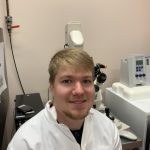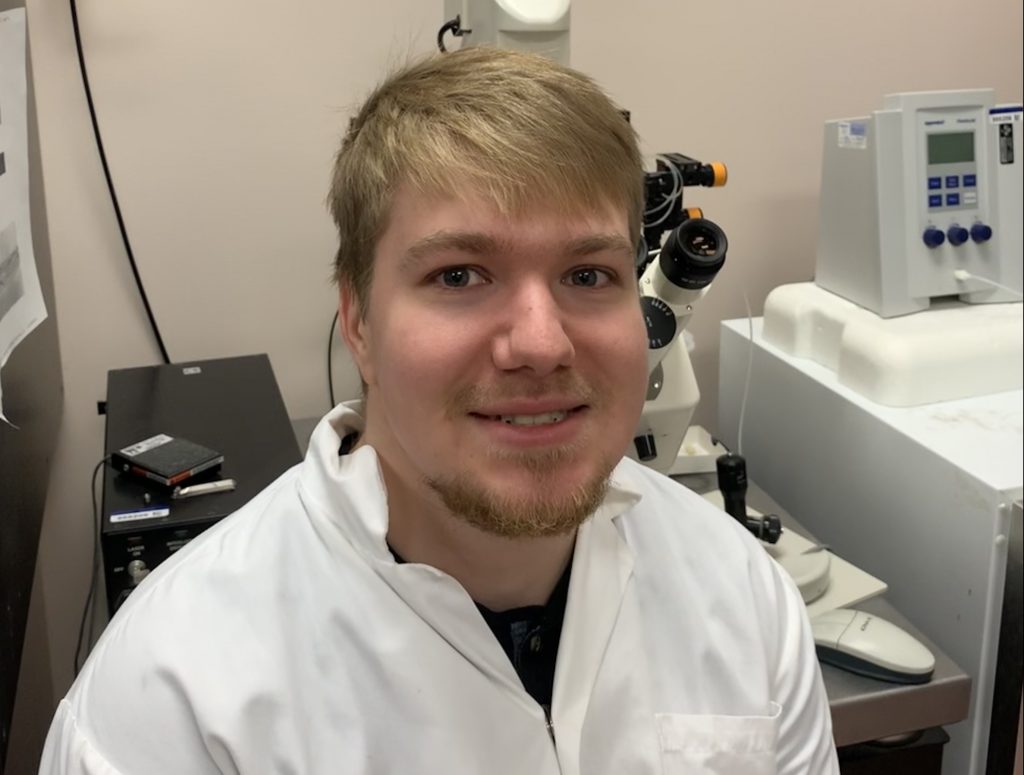We’re taking time over the following weeks to get to know the members of the GSA’s Early Career Scientist Committees. Join us every week to learn more about our 2019 early career scientist advocates.

Nathaniel Noblet
University of Ottawa
Policy Subcommittee
Research Interest
Convergent Extension (CE) is a type of cell movement that is used in a variety of developing tissues. Mutations and environmental factors that affect CE can lead to a severe subset of neural tube defects (NTDs), a group of conditions which include spina bifida and anencephaly in humans. In these conditions the normal development of the neural tube is interrupted, resulting in portions of the spinal cord or brain failing to close. Together, NTDs cause a range of complications including nerve damage and fatalities. While research has made progress in preventing NTD conditions by introducing grain supplementation with folate, the conditions remain common and devastating. Approximately 1 in 1000 Canadian newborns remains at risk for NTDs. This largely comes from a limited understanding of the underlying causes of NTDs and genetic pathways that control these processes.
C. elegans remains a powerful way to study how CE is controlled in developing embryos, which can help scientists better understand how NTDs develop. While C. elegans does not possess a neural tube, they do have a ventral nerve cord (VNC), which shares many aspects of neural tube closure, making it a great model for the development of NTDs. Both the closure of the neural tube and the formation of the VNC rely on similar mechanisms and are controlled by similar signaling pathways. My work aims to characterize novel proteins that control the overall CE process during formation of the VNC. This work will hopefully provide us with a better understanding of how severe NTDs arise and possible targets that we could use to prevent them.
As a PhD-trained scientist, you have many career options. What career paths interest you the most?
I see myself pursuing a research-intensive career at the intersection of neuroscience, genetics, and molecular medicine.
Basic research is an important step in the development of novel treatments and in gaining knowledge about mechanisms that are relevant to our health. I thoroughly enjoy the challenge of designing studies to figure out how novel genes function. I particularly like integrating existing research into an experiment and designing that experiment to be simple yet effective. This pairs well with the strengths that I have developed over the course of my studies—disseminating results and communicating with the public.
During my graduate training, I have also enjoyed the opportunity to collaborate with other scientists and travel to share my work. These experiences have been wonderful and have given me the desire to work toward a career that allows for collaboration in a research environment. Ideally, this would be paired with opportunities for advocacy and communication with the public.
In addition to your research, how else do you want to advance the scientific enterprise?
I am interested in improving how early career scientists communicate with the general public and government about their work and the needs that they have. Communication with both groups needs to be accurate, informative, and understandable because scientists often deal with unique situations and complex data. Fostering public interest in the scientific enterprise needs to be paired with government support for quality scientific education. This includes boosting funding for research and strengthening scientific programs within universities to incorporate different career paths.
Many students face challenges in getting an opportunity to participate in academic research due to economic constraints. Those who do get the opportunity face additional mental health issues, financial strain, and professional challenges within their programs, including getting work published or accessing additional training due to the size, location, or field of their lab. These are just some of the problems that have led to a lack of diversity within the scientific community.
To resolve these challenges, scientists must communicate with policy makers and the public about them and collaborate to find potential solutions. To that end, I hope to focus my efforts on promoting public university events, generating advocacy tools for scientists, strengthening support for early career scientists to communicate, and developing advocacy opportunities for graduate students who are interested in research. By addressing these issues, the next generation can view science as a more viable career avenue.
As a leader within the Genetics Society of America, what do you hope to accomplish?
As a member of the policy subcommittee, I have the opportunity to advocate for solutions to the challenges my fellow researchers face. I am looking forward to working with a diverse number of scientists from across the globe and gaining insight into the challenges and opportunities in their communities.
One goal I have for my time on the committee is to promote an understanding of policy and advocacy among the wider scientific community. As problems arise within our institutional administrations and governments, it is very important that early career scientists have the chance to learn about opportunities to advocate within their networks. In this regard, I hope that we can make the community aware of current and upcoming issues through blog posts and weekly newsletters.
Previous Leadership Experiences
- Vice-President, Local Committee of World University Service of Canada (WUSC) – University of Ottawa
- Representative, Faculty of Natural and Applied Sciences – Trinity Western University
Connect with Nathaniel Noblett on LinkedIn and ResearchGate.































